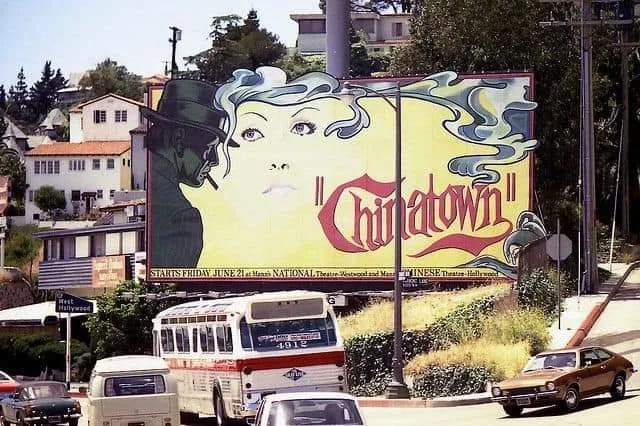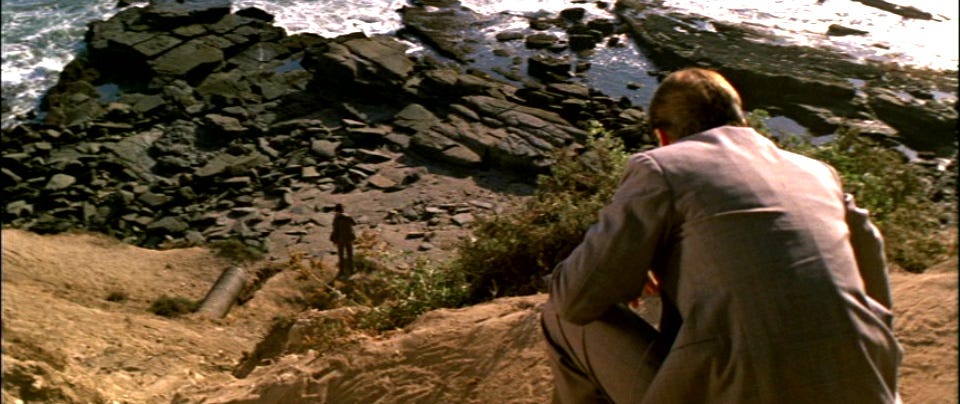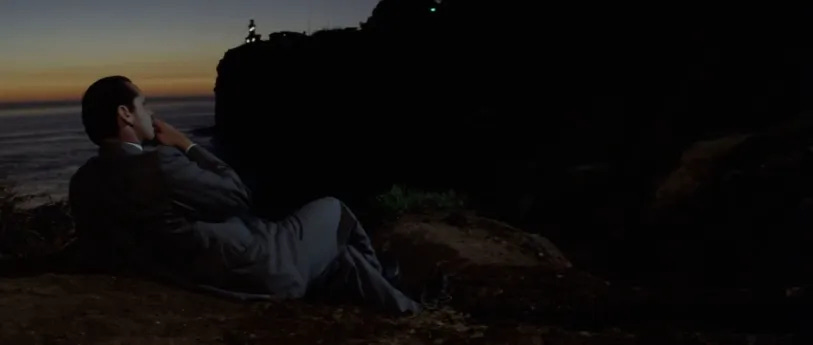Pop Culture, Cynicism, and the ‘70s: 'Chinatown' at 50
The only perfect American film is, somehow, even better five decades on
The class I taught this spring semester, “Creativity in Culture,” looked at the 20th Century, decade-by-decade, assessing the most significant (artistically, politically, aesthetically, etc.) pieces of music, media, and literature. It was, needless to say, both exhilarating and impossible. How can you make a reasonable list of the best works in a given year, much less an entire decade? Any act of list making involves compromise and a concession to failure, but also opportunity: we can acknowledge what’s left out while focusing on what—and why—things made the final list. And it’s instructive in ways that might not be anticipated: it was genuinely revelatory to consider vampire movies in the ‘30s in the wake of Wall Street’s Great Depression inducing meltdown, and how the weasels of Wall Street were, appropriately, referred to as vampires even as they had their intentional, unconscionable follies paid back in full during Obama’s first term.
Some decades, as you can imagine, were more difficult than others to summarize in one or two lectures, but other decades offer so much data, at once conflicting and connected (that, of course, is the point of art), you feel like you’re taking a teacup and dipping it in the ocean. Depending on how one looks at it, does what’s collected represent the whole or just hint at the hidden and expansive depths? Both, which is the point of such endeavors.
We had a wonderful time discussing and debating as the semester progressed: which decade was most influential, which years had the most heft, which ones both reflected their era and anticipated trends to come? Some powerful cases could be made for any individual decade, obviously. Still, some seemed undeniable. The ‘20s, that extended celebration with a welcome inclusivity of non-white cultures and influences, like a collective national exhale after The Great War; the inevitable intoxication and hangover, the gasp of exhaustion before the shit hit the fan—all summed up in the gift that keeps giving, the Great Novel of the century, Fitzgerald’s The Great Gatsby (more thoughts on that seminal text here).
Still, the types of sweeping generalizations that cultural aficionados are usually allergic to become inevitable. Thus, we appraise the ‘50s, broadly, as a time of conformity, of art that sought to establish a normality (again, a response to the next great war), a time of ostensible peace & prosperity despite the suffocating racial and sexual constraints. Thus, the ‘60s reflected a certain response to stasis, the combination of righteous indignation and optimism. The ‘70s: inexorable malaise and a holding pattern (were we making progress or taking two steps back, the art of the time saying same as it ever was?). And then the ‘80s, a weird combination of ‘50s follow-the-leader fealty and those iron guardrails of American shame (inculcated from our Puritan roots) beginning to loosen, aided by the Greed is Good ethos underpinning the Reagan Revolution (Government is The Enemy, etc.) and immortalized by Gordon Gekko in Wall Street. Who knows what, exactly, happened in the ‘90s: cable TV and the weird wide web opening a fissure in our spiritual ozone layer, making everyone the star of their lonely fantasy life. The 21st Century? Check back in a decade or two.
But getting back to the ‘70s…
At no time in American history was there such a clear-eyed, if ominously dark (cynics and Republicans might say pessimistic or, gasp, even anti-American) commentary on the ways our bloat and boredom were fattening up this empire for implosion. If the music and literature were all over the map (in all the best and necessary ways), the movies did, arguably, what no fiction, poetry, or journalism has done before or since: they revealed who we were, what we might have been, and what we still may become. The sheer tonnage of genius, taken as a whole, makes a compelling case that American cinema’s zenith occurred during the ten years between our moon landing and Apocalypse Now. (Other ‘70s masterpieces I’ve appraised at length include Five Easy Pieces, Serpico, The Conversation, Mean Streets, Taxi Driver, and The Deer Hunter
Perhaps it was inevitable, after the high hopes (literally, figuratively) of the late ‘60s, that the dread of reality (Meet the New Boss…) would result in art like this. Grim and despairing, for sure, but also deadly accurate and on point to the extent that we can (as always?) learn more from our artists than our journalists. I could invoke numerous songs and quotes, but I’ll always tip my cap to Hunter S. Thompson who gazed through the glass, darkly, and flawlessly captured the disenchantment.
There was madness in any direction, at any hour. If not across the Bay, then up the Golden Gate or down 101 to Los Altos or La Honda…You could strike sparks anywhere. There was a fantastic universal sense that whatever we were doing was right, that we were winning…And that, I think, was the handle—that sense of inevitable victory over the forces of Old and Evil. Not in any mean or military sense; we didn’t need that. Our energy would simply prevail. There was no point in fighting—on our side or theirs. We had all the momentum; we were riding the crest of a high and beautiful wave…So now, less than five years later, you can go up on a steep hill in Las Vegas and look West, and with the right kind of eyes you can almost see the high-water mark—that place where the wave finally broke and rolled back.
For my money, the single piece of art that not only nails this unique ‘70s aesthetic, as well as the one work, aside from possibly The Great Gatsby, that perfectly illuminates and critiques America (in general), capitalism (in particular) and the twin-evils of Greed & Power, is Chinatown, released fifty years ago, this summer. For a piece in 2009 (while we were still working through our own collective fear and loathing after yet another Wall Street meltdown), I described it as the only perfect American film. I stand by that assessment and fifteen years later—after 2016 and the nightmare we’re still sleeping uneasily through (Meet the New Boss…)—I feel even firmer in my conviction. The original piece follows, below.
Chinatown does not usually make the short list of best American films. In fairness, it probably shouldn’t. It will have to settle for merely being the only perfect American film ever made. Perfect? Well, perfection is in the eye of the beholder, and the definition of perfect might include the notion that there is no such thing as perfection in art. Nevertheless, by any number of criteria, Chinatown continues to satisfy more than thirty years on. In the final analysis it’s the magnificent sum of its considerable parts: it’s tragic, it’s hilarious, it’s (at times) scary, it’s challenging, it’s complicated, it is unnerving. It is, in short, America. Or at least it does the near impossible: it articulates the symbiotic relationship between greed and power that props up capitalism, a narrative that played an ever-increasing role in 20th century America. Much could—and should—be said along these lines, and how Robert Towne’s meticulous screenplay was ideal fodder for Roman Polanski’s dark and utterly authentic vision (Polanski also deserves extensive praise for resisting the happier ending Towne wanted).
That is all well and good, but why does Chinatown remain compelling, and worthy of repeated viewings? Speaking personally, I’ve seen the film at least 15 times in the last 20 years, and each viewing has revealed new layers or nuance, and has only confirmed that initial impression: it’s perfect. The screenplay, the soundtrack, the casting: all unassailable. Memorable scenes? Really, the entire movie is just a series of memorable scenes. Or, more accurately, a continuous stream of indelible moments: Gittes (Jack Nicholson) in the barber shop, covered in shaving cream, angrily inviting the wiseass banker to step outside and “discuss things”; Gittes sardonically lamenting the loss of his shoe (“Son of a bitch! Goddamn Florsheim shoe!”); Gittes telling the dirty joke unaware of his soon-to-be-client and lover standing behind him; Gittes driving frantically through an orange grove to escape some pissed off farmers whose land he is trespassing upon; Noah Cross (John Huston as the flawlessly named incarnation of evil) persistently, and quite intentionally, mispronouncing Gittes name (Mr. Gits); Gittes calling the officious jerk in the public library a weasel; Gittes imploring Evelyn Mulwray (Faye Dunaway) to let the police intervene against Cross (her father) and her unsettling response: “He owns the police!”… the list could go on.
Perhaps most importantly, this is, quite simply a beautifully crafted work, the type of movie that can be savored without the sound on. One example: Gittes sits patiently at the top of a sloping cliff, overlooking the Los Angeles coastline as day slides into evening. He waits, lighting cigarette after cigarette, totally unaware that he has already stumbled into a hornet’s nest of corruption. The beauty of what he sees (and we see) perfectly masks the brutal ugliness of what is really going on: unwittingly, Gittes is about to lift up the rock and behold the guts and machinery of what gets sold as the American dream.
Naturally, Chinatown passes the ultimate test: is it still meaningful, today? Does it still tell us something about ourselves? Sadly, it does. Impossible as it may have been for Towne and Polanski to imagine, there would come a time where public trust of those in power deteriorated beyond even the Watergate era nadir of Nixonland. Today, as the fabricated sheen of Wall Street crumbles around us, we might ask the wizards who wrought this mess the same question Gittes asks Cross—and expect the same answer:
“Why are you doing it? How much better can you eat? What could you buy that you can’t already afford?”
“The future, Mr. Gits! The future!”
There it is: the most accurate and succinct depiction of unfettered greed you’re likely to hear. And to see John Huston convey it is to appreciate, and be appalled by, the allure and immorality of depraved power. Jake hears it, and sees it, and for him—and the country—it’s too little, too late. As always. “Forget it, Jake, it’s Chinatown,” his partner admonishes him. But Jake can’t forget it, and we know he won’t forget it. Neither will we.








